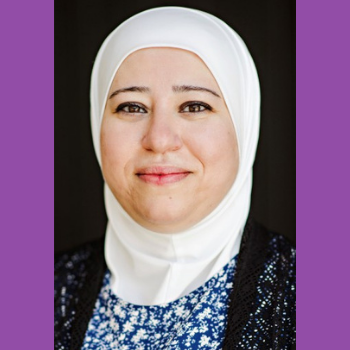We use cookies on this site to enhance your experience.
By selecting “Accept” and continuing to use this website, you consent to the use of cookies.

When I was young, my dream was to become a science professor. Chemistry was my favourite subject at high school. So, I decided to study chemistry at Yarmouk University in Jordan. My passion for research work did not stop when I attained my Bachelor’s degree in 1999 and thus, I directly joined the master’s program at the University of Jordan and carried out my thesis research titled “Chlorine decay rate and chlorination efficiency studies for drinking water in Jordan” at Water and Environment Research and Study Center. I worked as chemistry lecturer in academic field. In 2017, I came to Canada to fulfil my desired dream that is to become a professor. Therefore, I joined the chemistry PhD program at Wilfird Laurier University and started my research in phosphorous release and recovery from wastewater ferric sludge under supervision of Professor Scott Smith.
Municipal wastewater contains phosphorus (P) and could be an alternative P source to replace, or augment, non-renewable mining of phosphate rock. In fact, modern wastewater treatment plants are slowly shifting their focus from simple P removal to P recovery. Struvite from enhanced biological phosphorous removal (EBPR) plants, sludge incineration and direct land application of sludge are all potential approaches for recovery. However, these approaches have efficiency and economical limitations. A challenging, but potentially pragmatic approach, would be to recover P directly from sludge generated by chemical P removal (CPR) plants that use iron salts for P removal. CPR plants are widespread in North America and Europe, as only CPR can achieve the lowest limits of P removal. CPR plants generate iron-phosphate rich sludge due to the interaction of the metal cations with phosphate ions in wastewater. The knowledge regarding the specific chemistry of iron-phosphate rich sludge in CPR plants (e.i., their formation, stability, solubility, the effect of pH, oxidation-reduction, role of sulfides and humic substances, and rates of transformations) is poor though and needs more investigation. The results of such detailed investigations will determine the theoretical and practical potential for direct phosphorus recovery from wastewater chemical sludge and assess.
The best way to keep you passion thriving is by engaging in pleasant activities and by doing the work one’s love. My passion, as a graduate student, is chemistry, so I love to be up to date with the chemical research and I always enjoy doing experiments in lab. Secondly, I always maintain the objectives of my graduate plan in my mind, and I keep reminding myself of all the prosperous results that I will attain after graduation. Moreover, I always keep enthusiastic and dynamic people around me which affected my academic work positively.
If you are interested in pursuing graduate studies, I would like to give you this piece of advice: Keep in mind that any great efforts you do to achieve your degree will bring you great results and benefits after you start your career. Also, remember that getting a higher degree will not only expand your knowledge in the science that you love, but it will enhance your financial status as well. Moreover, you will get better career opportunities after finishing your graduate degree requirements, and that will reward you and your family with success and prosperity.